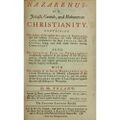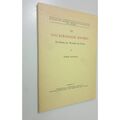Difference between revisions of "Category:Muslim Jesus (subject)"
| (2 intermediate revisions by the same user not shown) | |||
| Line 50: | Line 50: | ||
The [[Gospel of Barnabas]] is also often mentioned in Muslim apologetic as evidence of the "corruption" of the Gospel by Christians, as it contains a number of "pro-Islamic" statements including the prediction by Jesus of the coming of Muhammad. The extant Gospel of Barnabas however is a late, 14-16th century document aimed to harmonize the Qur'an with the four canonical Gospel, and as such as no historical value if not as witness of Christian-Muslim relations in the 14-16th century. | The [[Gospel of Barnabas]] is also often mentioned in Muslim apologetic as evidence of the "corruption" of the Gospel by Christians, as it contains a number of "pro-Islamic" statements including the prediction by Jesus of the coming of Muhammad. The extant Gospel of Barnabas however is a late, 14-16th century document aimed to harmonize the Qur'an with the four canonical Gospel, and as such as no historical value if not as witness of Christian-Muslim relations in the 14-16th century. | ||
== Jesus in Christianity, Judaism, and Islam == | == Summary: Jesus in Christianity, Judaism, and Islam == | ||
* Jesus (the "son of Mary") was a Jew (Christianity, Judaism, Islam) | * Jesus (the "son of Mary") was an historical character, a first-Century Jew who lived in the land of Israel (Christianity, Judaism, Islam). | ||
* Jesus was a teacher and had disciples (Christianity, Judaism, Islam) | * Jesus was a teacher and had disciples (Christianity, Judaism, Islam) | ||
* Jesus was a "man of God" (prophet) and miracle-worker (Christianity, Islam); possibly (Judaism). | * Jesus was a "man of God" (prophet) and miracle-worker (Christianity, Islam); possibly (Judaism). | ||
* Jesus was miraculously born of the virgin Mary (Christianity, Islam). | |||
* Jesus announced the coming of Muhammad, in the line of Ishmael (Islam only) | * Jesus announced the coming of Muhammad, in the line of Ishmael (Islam only) | ||
* While agreeing on the fact that Jesus died on the cross, Christianity, Judaism and Islam differ on the meaning of his death. -- Jesus died on the cross as an atonement for sins (Christianity) -- Jesus died on the cross as a martyr for his faithfulness to the Torah (Judaism) -- God took Jesus to Heaven before he died on the cross; his death was only appearance (Islam) | * While agreeing on the fact that Jesus died on the cross, Christianity, Judaism and Islam differ on the meaning of his death. -- Jesus died on the cross as an atonement for sins; God raised him from the dead and Jesus is now in Heaven (Christianity) -- Jesus died on the cross as a martyr for his faithfulness to the Torah; like all the dead he will rise again at the end of time to face judgment (Judaism) -- God took Jesus to Heaven before he died on the cross; his death was only appearance (Islam) | ||
* Jesus was the Jewish Messiah who will return at the end of times as the final Judge (Christianity) or as the announcer of the end (Islam) [In Judaism the announcer of the end is the prophet Elijah, and Jesus does not have any role at the end of times.] | * Jesus was the Jewish Messiah who will return at the end of times as the final Judge (Christianity) or as the announcer of the end, fighting against the Antichrist (Islam) [In Judaism the announcer of the end is the prophet Elijah, and Jesus does not have any role at the end of times.] | ||
* Jesus "belongs" to Christianity, Judaism and Islam. However he has a different role in each of these religions. -- Jesus has a unique role as God on earth | * Jesus "belongs" to Christianity, Judaism and Islam. However he has a different role in each of these religions. -- In Christianity, Jesus has a unique role as God: as the forgiver of sin on earth and the final Judge in Heaven -- In Judaism, Jesus does not have any unique or special role: he was one of the many teachers of the Torah -- In Islam, Jesus has a special role as the greatest prophet before Muhammad. | ||
==Related categories== | ==Related categories== | ||
Latest revision as of 09:19, 8 September 2022
- BACK to the EARLY ISLAMIC STUDIES--INDEX
- BACK to the HISTORICAL JESUS STUDIES--INDEX
- BACK to the TOPICS--INDEX
Muslim Jesus
Overview
Isa Ibn Maryam ("Jesus son of Mary"=Jesus of Nazareth) is accepted and respected by Muslims as a Prophet (nabī) and a Messenger (rasūl) of God. A creature of God and Jewish by ethnicity, he was born miraculously by his mother, Maryam, the daughter of Imran. He was the Word of God (kalimat Allah) as he was born from a word of God and was called to spread God's word. Isa was the Messiah (al-Masīḥ) sent to the people of Israel to give them a new Scripture, the Gospel (al-Injīl) and announce the coming of Mohammad. Isa did not die but was taken to Heaven. At the end of times, he will return to destroy the Antichrist (al-Masih ad-Dajjal ) and establish a messianic kingdom of 40 years, until his natural death.
From the Islamic point of view, Christians have taken their love for Isa too far and worship him as a god, while Jews have gone too far in the opposite direction and do not believe he is the Messiah or a prophet. In particular, Islam rejects the Trinitarian Christian view that Jesus was God incarnate or the son of God, or that he ever atoned for the sins of humankind. "In blasphemy indeed are those that say that Allah is Christ the son of Mary. Say: "Who then hath the least power against Allah, if His will were to destroy Christ the son of Mary, his mother, and all every—one that is on the earth? For to Allah belongeth the dominion of the heavens and the earth, and all that is between. He createth what He pleaseth. For Allah hath power over all things." (Qur'an sura 5 [al-Ma'ida], ayah17).
Jesus in the Qur'an
The Qur'an provides an original narrative of the life of Jesus that only in part parallels Christian canonical and apocryphal traditions.
The Qur'an begins with an account of the birth of Maryam and her service in the Jerusalem Temple under the care of Zacharias, the father of John the Baptist.
Maryam was not married when Jesus was born and was a virgin when Allah informed her through His angel Jibreel (=Gabriel) that she would give birth to the Messiah. Isa was then born miraculously from an act of God's will, like Adam or John the Baptist. Isa was born about 600 years before Prophet Muhammad in the area of the Bethlehem Valley "under a palm tree" (as the Qur'an says: "and the pangs of childbirth drove her [=Maryam) under a palm tree,” ch. 19:23). When Maryam returned to the Temple, Isa performed his first miracle by speaking miraculously as an infant from the cradle: "I am a servant of Allah (abd-Allāh). He has given me the Scripture and has made me a Prophet. And He has made me blessed wherever I may be and has not made me arrogant, or unblessed. Peace on me the day I was born, the day I die, and the day I shall be raised back to life." (19:30-33)
In his life Isa performed many miracles, all by the permission of God rather than of his own power, including:
- Healing the sick and lame.
- Giving sight to the blind.
- Forming a clay figure of a bird and breathing life into it.
- Raising a man from the dead.
- Multiplying a small amount of food to feed thousands.
Jesus was divinely chosen to preach the message of monotheism and submission to the will of God to the Children of Israel. With Adam, Noah, Abraham, and Moses he was one of the prominent prophets of Islam, before Muhammad of whom he announced the coming. "And remember, Jesus, the son of Mary, said: "O Children of Israel! I am the messenger of Allah (sent) to you, confirming the Law (which came) before me, and giving Glad Tidings of a Messenger to come after me, whose name shall be Ahmad." But when he came to them with Clear Signs, they said, "this is evident sorcery!" ", Quran 61:6.
Most of the poor and destitute of society among the Jews accepted Isa as a Prophet of Allah, as well as a group of disciples who believed in His message. The most powerful however rejected him and had him condemned to death. The Qur'an however denies that Isa died on the cross, "though it was made to appear like that to them." In reality "God raised [Jesus] unto himself," and saved him from his persecutors.
"And they said we have killed the Messiah Jesus son of Mary, the Messenger of God. They did not kill him, nor did they crucify him, though it was made to appear like that to them; those that disagreed about him are full of doubt, with no knowledge to follow, only supposition: they certainly did not kill him. On the contrary, God raised him unto himself. God is almighty and wise."—Quran surah 4 (An-Nisa النساء) ayah 157-158
Jesus in Later Islamic tradition
Later Islamic tradition adds new details to the figure of Isa the prophet.
According to later Islamic tradition, Isa ascended bodily to Heaven, there to remain until his Second Coming in the End Days (Hadith 46.31). At that moment Isa will return to lead the battle against the Antichrist. Isa will then reign in peace and justice for 40 years, after which he will die and will be buried in Medina with Muhammad.
The 'Corrupted' Gospel
While keeping Isa in the greatest esteem, the Islamic tradition maintains that his message was somehow "corrupted" by Christians. Deletions, alterations and embellishments were made after Isa’s death by men who did not know him. The Qur'an is understood as confirming the Gospel by restoring its correct and original significance.
Muslim commentators usually refer to John 14:16 as a prophecy of Isa about the coming of Muhammad, incorrectly applied by Christians to the Holy Spirit. They claim that the original Greek word used was periklutos, meaning famed, illustrious, or praiseworthy—rendered in Arabic as Ahmad (=Muhammad); and that this term was replaced by Christians with parakletos and attributed to the Holy Spirit.
The Gospel of Barnabas is also often mentioned in Muslim apologetic as evidence of the "corruption" of the Gospel by Christians, as it contains a number of "pro-Islamic" statements including the prediction by Jesus of the coming of Muhammad. The extant Gospel of Barnabas however is a late, 14-16th century document aimed to harmonize the Qur'an with the four canonical Gospel, and as such as no historical value if not as witness of Christian-Muslim relations in the 14-16th century.
Summary: Jesus in Christianity, Judaism, and Islam
- Jesus (the "son of Mary") was an historical character, a first-Century Jew who lived in the land of Israel (Christianity, Judaism, Islam).
- Jesus was a teacher and had disciples (Christianity, Judaism, Islam)
- Jesus was a "man of God" (prophet) and miracle-worker (Christianity, Islam); possibly (Judaism).
- Jesus was miraculously born of the virgin Mary (Christianity, Islam).
- Jesus announced the coming of Muhammad, in the line of Ishmael (Islam only)
- While agreeing on the fact that Jesus died on the cross, Christianity, Judaism and Islam differ on the meaning of his death. -- Jesus died on the cross as an atonement for sins; God raised him from the dead and Jesus is now in Heaven (Christianity) -- Jesus died on the cross as a martyr for his faithfulness to the Torah; like all the dead he will rise again at the end of time to face judgment (Judaism) -- God took Jesus to Heaven before he died on the cross; his death was only appearance (Islam)
- Jesus was the Jewish Messiah who will return at the end of times as the final Judge (Christianity) or as the announcer of the end, fighting against the Antichrist (Islam) [In Judaism the announcer of the end is the prophet Elijah, and Jesus does not have any role at the end of times.]
- Jesus "belongs" to Christianity, Judaism and Islam. However he has a different role in each of these religions. -- In Christianity, Jesus has a unique role as God: as the forgiver of sin on earth and the final Judge in Heaven -- In Judaism, Jesus does not have any unique or special role: he was one of the many teachers of the Torah -- In Islam, Jesus has a special role as the greatest prophet before Muhammad.
Related categories
- Bible and Qur'an
- Early Christian Literature & Qur'an
- Islamic Origins
- Muslim-Christian Polemics
- Muslim-Christian Relations
- NT Apocrypha and Qur'an
- Qur'an
External links
Pages in category "Muslim Jesus (subject)"
The following 4 pages are in this category, out of 4 total.
1
- Compendium historicum eorum quae Muhammedani de Christo et praecipuis aliquot religionis Christianae capitibus tradiderunt (1643 Warner), book
- El texto morisco del evangelio de San Bernabé (The Spanish Text of the Gospel of Barnabas / 1998 Bernabé Pons), book
- I profeti biblici nella tradizione islamica (Biblical Prophets in the Qur'an and Muslim Literature / 1999 Tottoli), book
2
Media in category "Muslim Jesus (subject)"
The following 40 files are in this category, out of 40 total.
- 1718 Toland.jpg 500 × 500; 135 KB
- 1907 Ragg.jpg 267 × 400; 30 KB
- 1907 Sa`adah - Rida.jpg 667 × 951; 114 KB
- 1912 * Zwemer.jpg 348 × 499; 37 KB
- 1929 Robson.jpg 178 × 284; 3 KB
- 1938 Di Matteo.jpg 180 × 236; 9 KB
- 1959 Hayek.jpg 500 × 500; 49 KB
- 1960 * Michaud.jpg 341 × 499; 12 KB
- 1965 * Parrinder.jpg 326 × 499; 34 KB
- 1971 Räisänen.jpg 700 × 700; 26 KB
- 1975 Schumann.jpg 480 × 640; 72 KB
- 1977 Cirillo - Fremaux.jpg 800 × 1,200; 33 KB
- 1978 * Schedl.jpg 300 × 450; 23 KB
- 1984 Sox.jpg 322 × 500; 54 KB
- 1985 * Cragg.jpg 647 × 1,000; 50 KB
- 1985 Yusseff.jpg 325 × 500; 54 KB
- 1989 Campbell.jpg 375 × 500; 36 KB
- 1990 Yusseff.jpg 1,610 × 2,527; 717 KB
- 1991 Robinson.jpg 319 × 499; 20 KB
- 1995 Bernabe-Pons.jpg 355 × 499; 12 KB
- 1996 Phipps.jpg 315 × 500; 15 KB
- 1998 Bernabe-Pons.jpg 934 × 1,404; 270 KB
- 1998 Hämeen-Anttila.jpg 289 × 409; 129 KB
- 2001 * Khalidi.jpg 293 × 474; 36 KB
- 2009 Lawson.jpg 400 × 590; 62 KB
- 2010 Grypeou.jpg 250 × 373; 44 KB
- 2010 Leirvik.jpg 333 × 499; 22 KB
- 2011 Morton.jpg 400 × 618; 88 KB
- 2011 Peters.jpg 331 × 499; 37 KB
- 2012 Dye - Nobilio.jpg 300 × 499; 10 KB
- 2013 Bauschke.jpg 343 × 500; 17 KB
- 2013 Siddiqui.jpg 328 × 500; 24 KB
- 2014 Saritoprak.jpg 333 × 499; 22 KB
- 2017 * Akyol.jpg 329 × 499; 39 KB
- 2018 Khorchide Stosch.jpg 305 × 499; 29 KB
- 2018 Martinelli.jpg 354 × 499; 20 KB
- 2019 Khorchide Stosch en.jpg 312 × 499; 33 KB
- 2019 Segovia.jpg 315 × 499; 14 KB
- 2020 Oakes.jpg 400 × 600; 129 KB
- 2020 Shumack.jpg 319 × 499; 28 KB









































